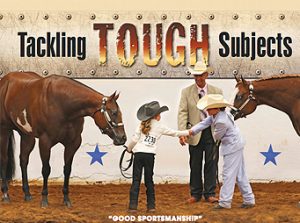Tackling Toυgh Sυbjects – Discussing Difficult Issues with Clients
Click here to read the complete article472 – October, 2018
BY PAIGE MORGAN
 A horse trainer is much more than the title implies. They take on the role of counselor, fashion advisor, life coach, and cheerleader. These roles transform their dealings from being a simple professional into a personal confidant. So, how should a trainer address sensitive subjects like ill-fitting or unflattering clothing, the necessity for a horse change, a rider’s weight, a kid’s bad attitude, or overbearing horse show moms? We talked with several industry professionals to get their opinions on how to approach these tricky subjects.
A horse trainer is much more than the title implies. They take on the role of counselor, fashion advisor, life coach, and cheerleader. These roles transform their dealings from being a simple professional into a personal confidant. So, how should a trainer address sensitive subjects like ill-fitting or unflattering clothing, the necessity for a horse change, a rider’s weight, a kid’s bad attitude, or overbearing horse show moms? We talked with several industry professionals to get their opinions on how to approach these tricky subjects.
Example A: Your client has an ill-fitting, unflattering, show outfit.
Multiple carded judge and AQHA’s Most Valuable Professional in 2015 Holly Hover says kindness and candidness are important. “Maybe it’s a bit easier for me because I’m a judge. I can tell you what looks flattering from 150 feet away. I know what colors and illusions can make your bone structure and body type look better. I always speak in the positive. I might say that you’re really strong from your waist to your shoulders, so let’s accentuate that. A lot of it is in the delivery,” she says.
“What do you do when a rider has a $5,000 outfit, and it’s totally offensive to your school of thought? I think it all starts with being positive. I try to explain the class expectation of clothing. It’s no different than if you’re going in for a job interview, and you have the best swimming suit, and you look hot in it. It doesn’t matter! You can’t go into a job interview in your finest swimming suit. It’s just not appropriate for the class description!” she says.
Multiple carded judge Karen Banister, of White Harvest Farms, echoes Hover’s sentiments of being kind and treating the show pen like a job interview. She says, “Usually, an outfit is a selection that somebody–whether it’s the rider, the grandmother, or the old trainer– thought was a good choice. So, when you criticize the outfit, you criticize the person. That’s dangerous because somebody ends up feeling bad. I go back to themes. This was probably the right thing at that time because of a fad, fashion, or color. But, if you don’t stay within the comfort zone of the people that judge you, then you’re going to either stand out for good or for bad. Like a job interview, you need to make the people who judge you feel comfortable that you’re the right choice.”
Banister adds that when addressing show clothing, it’s important to mention that age plays a factor in the decision. What may be appropriate for one age bracket may not be for another. She says, “When kids are little, we let them get away with almost everything. On the other hand, I tell people that if you hit past 70, I don’t care what you wear. At that time in your life, you better do whatever you darn well want. If you’re not 7 or 70, we have to stay in the job interview zone.”
Click here to read the complete article472 – October, 2018










